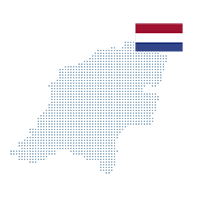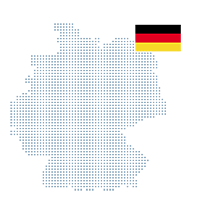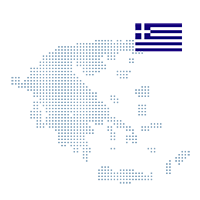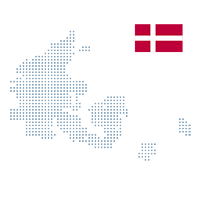Populist movements in Europe
Populist movements have gained varying levels of presence and influence across different regions of Europe. While their impact can be observed in numerous countries, it is important to note that the extent and nature of their presence can differ significantly.
Which populist parties do you know? Where do they belong to?
Drag the card with the name of a party and drop it on the matching country:
Here is a geographic and political description of the presence different populist movements in Europe:
Western Europe
In Western Europe, populist movements have made notable inroads in countries such as France, the Netherlands, and Germany. The National Front in France, led by Marine Le Pen, has enjoyed electoral success, particularly in the presidential elections. The Party for Freedom (PVV) in the Netherlands, led by Geert Wilders, has also garnered support with its anti-immigration and Eurosceptic stance. In Germany, the Alternative for Germany (AfD) has emerged as a significant force, particularly in the aftermath of the European refugee crisis.
Countries in detail
| Country and Populist party | Description |
 Front Nationale(Rassemblement Nationale)(France) Front Nationale(Rassemblement Nationale)(France) |
The National Front is a French eurosceptic party that has achieved significant electoral results over the years. In addition to its skepticism towards European policies, the party supports a tough stance on immigration (border closure) and considers it essential to assert French sovereignty in relation to the European Union. Adverse to the traditional political system, it has always been led by the Le Pen family. |
 Partij voor de Vrijheid(Netherlands) Partij voor de Vrijheid(Netherlands) |
Partij voor de Vrijheid (Party for Freedom), commonly known as the PVV, is a right-wing populist and eurosceptic political party in the Netherlands. Founded in 2006 by Geert Wilders, the PVV has gained prominence for its controversial positions on immigration, Islam, and the European Union. The party advocates for stricter immigration policies, including the banning of Islamic symbols and practices in public spaces. It also promotes a nationalist agenda, emphasizing the importance of Dutch identity and culture. With its strong anti-establishment stance and emphasis on national sovereignty, the PVV has become one of the key political forces in the Netherlands, often influencing the country’s political debates and policies. |
 Alternative für Deutschland(Germany) Alternative für Deutschland(Germany) |
The Alternative für Deutschland (Alternative for Germany, AfD) is a right-wing populist and nationalist political party in Germany. Established in 2013, the party has gained significant attention and electoral success. The AfD is known for its anti-immigration and anti-Islam stance, as well as its opposition to the European Union and Eurozone. The party advocates for stricter immigration policies, protection of national identity, and a more assertive approach to national sovereignty. The AfD has attracted support from individuals dissatisfied with mainstream politics, particularly regarding issues related to immigration, globalization, and perceived threats to German culture. While the party has faced controversy and internal divisions, it has managed to secure seats in the German Bundestag and several state parliaments, making it a notable force in German politics. |
Southern Europe
Populist movements have had a significant presence in Southern European countries that were heavily affected by the Eurozone crisis. For example, in Italy, the Five Star Movement (M5S) founded by Beppe Grillo gained significant support and became a major political force. Spain has seen the rise of the left-wing populist party Podemos, which has challenged the established political order. Greece experienced the emergence of Syriza, a left-wing populist party, which achieved electoral success during the economic crisis
Countries in detail
| Country and Populist party | Description |
 Fratelli d’Italia(Italy) Fratelli d’Italia(Italy) |
Fratelli d’Italia (Brothers of Italy, FdI) is a national-conservative and populist party. In the 2022 parliamentary elections, they became the strongest party and thus, with their leader Giorga Meloni, provide the Prime Minister of Italy. |
 Lega(Italy) Lega(Italy) |
Lega (English: League, official name Lega per Salvini Premier), is a right-wing populist political party in Italy, led by Matteo Salvini. Lega is the informal successor of Lega Nord. In February 2021 Lega joined Mario Draghi’s government of national unity, providing three ministers. Since October 2022 the party has participated in Giorgia Meloni’s government with five ministers, including Salvini as deputy prime minister. |
 Movimento 5 Stelle(Italy) Movimento 5 Stelle(Italy) |
The Movimento 5 Stelle (Five Star Movement, M5S) is a populist and anti-establishment political party in Italy. Founded in 2009 by comedian Beppe Grillo and web strategist Gianroberto Casaleggio, the party has gained significant support and political influence. The M5S presents itself as a grassroots movement focused on direct democracy, environmentalism, and anti-corruption measures. It seeks to challenge traditional political elites and implement policies based on citizen participation and online decision-making platforms. The party has advocated for various policy positions, including universal income, environmental sustainability, and skepticism towards the European Union. With its blend of online activism, direct democracy, and anti-establishment rhetoric, the M5S has emerged as a major political force in Italy, often forming coalitions or leading governments at different levels of governance. |
 Podemos(Spain) Podemos(Spain) |
Podemos, which means “We Can” in Spanish, is a left-wing populist political party in Spain. Founded in 2014, Podemos emerged as a response to the economic crisis and widespread discontent with traditional political parties. The party’s ideology combines elements of populism, anti-austerity, and social justice. Podemos advocates for greater economic equality, social welfare programs, and participatory democracy. It has championed progressive policies such as a universal basic income, affordable housing, and a more redistributive tax system. Podemos gained significant popularity by mobilising grassroots movements and utilising social media as a tool for political engagement. While it initially focused on domestic issues, the party has also criticised the European Union’s handling of economic policies. Podemos has been influential in reshaping the political landscape in Spain and has gained representation in the Spanish parliament and various regional governments. |
 Vox(Spain) Vox(Spain) |
Vox is a right-wing populist party, characterized by its nationalist, conservative and anti-immigration positions. Born in 2013, Vox has acquired an ever-increasing role in Spanish politics, especially since 2019, when in the Spanish general election he established himself as the third most present party in Parliament, obtaining 15.08% of the votes and 52 seats. Vox believes that more stringent immigration management is needed. It also supports the project of greater centralisation of powers in the hands of the Spanish Government, in order to protect the Spanish national identity and sovereignty over separatist movements. In the economic sphere, it supports the free market and the reduction of taxes. |
 Syriza(Greece) Syriza(Greece) |
Syriza, an acronym for “Coalition of the Radical Left,” is a left-wing political party in Greece. Formed in 2004 as an alliance of various left-wing parties and groups, Syriza gained significant attention during the Greek debt crisis. The party rose to prominence under the leadership of Alexis Tsipras and emerged as a major force in Greek politics. Syriza’s platform combines anti-austerity measures, social justice, and opposition to neoliberal policies. The party advocates for increased government spending, the protection of workers’ rights, and the redistribution of wealth. It criticizes the influence of international financial institutions and has taken a skeptical stance towards the European Union’s economic policies. Syriza’s rise to power in 2015 marked a significant shift in Greek politics, and it formed a government that aimed to renegotiate Greece’s bailout terms. Although the party faced challenges and policy compromises while in power, Syriza remains an influential left-wing force in Greek politics, advocating for progressive policies and social reform. |
 Portugal(CHEGA!) Portugal(CHEGA!) |
Chega (in english „enough“) is a national conservative, right-wing populist political party in Portugal formed in 2019 by André Ventura. In the 2022 general elections, the party reached 7,2%. Chega presents itself as national conservative and social conservative, focussing on criminality issues. |
Eastern Europe
Populist movements have found fertile ground in several Eastern European countries. Hungary, under the leadership of Viktor Orbán and his Fidesz party, has pursued a populist agenda with a focus on national sovereignty, immigration, and illiberal policies. Poland’s Law and Justice (PiS) party has also embraced populist rhetoric and pursued nationalist policies, particularly with regards to the judiciary and media. In other Eastern European countries, populist movements have seen varying levels of success and influence.
Countries in detail
| Country and Populist party | Description |
 Fidesz(Hungary) Fidesz(Hungary) |
Fidesz, also known as Fidesz – Hungarian Civic Alliance, is a right-wing nationalist and conservative political party in Hungary. Founded in 1988, Fidesz initially emerged as a liberal youth movement advocating for democratic reforms and Hungary’s integration into European institutions. However, over time, the party shifted towards right-wing policies under the leadership of Viktor Orbán. Fidesz promotes a nationalistic agenda centred on preserving Hungarian identity, culture, and sovereignty. The party emphasises traditional values, family values, and conservative social policies. Fidesz has implemented policies aimed at strengthening national security, restricting immigration, and promoting economic nationalism. It has also been criticised for its erosion of democratic institutions and concentration of power under Viktor Orbán’s leadership. Fidesz has enjoyed electoral success, winning multiple parliamentary elections and maintaining a strong presence in Hungarian politics. It has also been a member of the European People’s Party (EPP) but suspended its membership in 2021 due to disagreements with the EPP on certain issues. |
 Prawo i Sprawiedliwość(Poland) Prawo i Sprawiedliwość(Poland) |
Prawo i Sprawiedliwość (Law and Justice, PiS) is is a prominent political party in Poland. Founded in 2001, the party is known for its conservative and nationalist platform. It has played a significant role in defining the country’s political landscape and has been in power on several occasions since its creation. The Law and Justice Party is characterized by its socially conservative positions on issues such as abortion and LGBTQ+ rights, as well as its defense of a strong national identity and a robust welfare state. PiS criticizes the European Union, often asserting Poland’s sovereignty and opposing certain EU policies. During its time in power, the party implemented a number of policies aimed at strengthening the Polish state and promoting what it considers traditional Polish values. This includes reforms in the judiciary, media and education sectors, which have sparked controversy both in Poland and internationally.
|
 Konfederacja (Poland) Konfederacja (Poland) |
Konfederacja Wolność i Niepodległość (Confederation Liberty and Independence, shortened to Konfederacja) is a far-right political alliance in Poland. It was founded in 2018 as a political coalition for the 2019 European Parliament election and later expanded into a political party. In the 2020 elections, Its presidential candidate Krzysztof Bosak placed fourth among eleven candidates. The party is considered to be a part of the radical right with a hardline opposition stance to the European Union, socially conservative positions and xenophobic views. |
Nordic countries
Nordic Countries: Populist movements have also gained traction in the Nordic countries. In Denmark, the Danish People’s Party has made significant electoral gains with its anti-immigration platform. In Sweden, the Sweden Democrats have grown in prominence, reflecting concerns over immigration and national identity.
Countries in detail
| Country and Populist party | Description |
 FolkepartiDenmark(Dansk) FolkepartiDenmark(Dansk) |
Dansk Folkeparti (Danish People’s Party, DF or DPP) is a nationalist and right-wing populist political party in Denmark founded in 1995. From 2002 until 2011 it was a member of the coalition government. Their policies relate primarily to the protection of Danish identity and heritage, with particular focus on limiting immigration and rejecting multiculturalism. The past years, the party has seen a decline in support, resulting in its so far worst general election result with 2,6% in 2022. |
 Perussuomalaiset(Finland) Perussuomalaiset(Finland) |
Perussuomalaiset, the Finns party, formerly True Finns, is a right-wing populist party founded in 1995. The party has achieved significant electoral success since 2011. During the 2023 Finnish parliamentary election the Finns Party finished in second place and recorded their strongest result, 46 seats, since the party’s founding. The party combines left-wing economic policies with socially conservative values and nationalist positions. |
 Sverigedemokraterna(Sweden) Sverigedemokraterna(Sweden) |
Sverigedemokraterna (Sweden Democrats, SD) is a right-wing populist and nationalist party in Sweden. They advocate for stricter immigration policies and aim to protect Swedish culture and national identity. The party has gained electoral success and has influenced debates on immigration and social policies in Sweden. |
